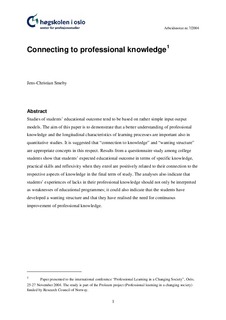| dc.contributor.author | Smeby, Jens-Christian | |
| dc.date.accessioned | 2020-05-20T11:00:54Z | |
| dc.date.accessioned | 2020-08-26T06:05:09Z | |
| dc.date.accessioned | 2021-04-29T08:58:53Z | |
| dc.date.available | 2020-05-20T11:00:54Z | |
| dc.date.available | 2020-08-26T06:05:09Z | |
| dc.date.available | 2021-04-29T08:58:53Z | |
| dc.date.issued | 2004 | |
| dc.identifier.uri | https://hdl.handle.net/20.500.12199/3108 | |
| dc.description.abstract | Studies of students’ educational outcome tend to be based on rather simple input output models. The aim of this paper is to demonstrate that a better understanding of professional knowledge and the longitudinal characteristics of learning processes are important also in quantitative studies. It is suggested that “connection to knowledge” and “wanting structure” are appropriate concepts in this respect. Results from a questionnaire study among college students show that students’ expected educational outcome in terms of specific knowledge, practical skills and reflexivity when they enrol are positively related to their connection to the respective aspects of knowledge in the final term of study. The analyses also indicate that students’ experiences of lacks in their professional knowledge should not only be interpreted as weaknesses of educational programmes; it could also indicate that the students have developed a wanting structure and that they have realised the need for continuous improvement of professional knowledge. | en |
| dc.language.iso | en | en |
| dc.publisher | Høgskolen i Oslo | en |
| dc.relation.ispartofseries | ;nr. 7 | |
| dc.subject | Profesjonalitet | en |
| dc.title | Connecting to professional knowledge | en |
| dc.type | Working paper | en |
| fagarkivet.author.link | https://www.oslomet.no/om/ansatt/jensch/ | en |
| fagarkivet.source.pagenumber | 17 | en |
